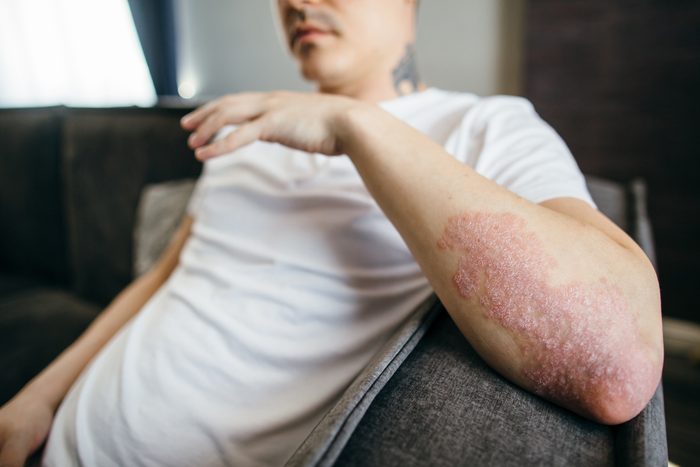Have Acne, Eczema or Psoriasis? Know This About Your Monkeypox Risk, and a Doctor’s Prevention Tips
Updated: Aug. 10, 2022

Nearly 40 million Americans experience eczema and psoriasis. Here's why a dermatologist says people with a compromised skin barrier are likely at higher risk of contracting monkeypox.
The Centers for Disease Control and Prevention reported August 9 that there were 9,492 confirmed cases of monkeypox in the U.S. Following President Biden’s August 4 declaration of a U.S. public health emergency, more Americans are growing concerned about their risk—and what could happen if they catch the virus. For the approximately 31 million people around the country diagnosed with eczema and the nearly 8 million with psoriasis, some experts are working to raise awareness about particular issues related to monkeypox these individuals may want to keep an eye out for.
According to Dr. Peter Lio, MD, FAAD, a board-certified dermatologist and clinical assistant professor at Northwestern University Feinberg School of Medicine: “There’s no need to panic—it’s important to remember that monkeypox is generally mild and self-limited. But if you’re part of a higher-risk group and have a history of eczema or atopic dermatitis, and/or people with eczema in your household, then it’s important to take precautions to prevent the spread of monkeypox.”
According to the Centers for Disease Control and Prevention (CDC), people with similar exfoliative skin conditions such as psoriasis, impetigo or severe acne, among others, are also at risk of serious infection of monkeypox.
A Chief of Infectious Disease Just Cleared Up 6 Confusing Monkeypox Questions
Why are people with eczema more at risk for monkeypox?
Dr. Lio says that because people with eczema have a weakened skin barrier, it is easier for viruses and bacteria to infect their skin and spread. “Monkeypox infections in people with eczema may behave similarly to eczema herpeticum or eczema vaccinatum, both of which pose serious health risks and require immediate treatment and possibly hospitalization,” he tells The Healthy @Reader’s Digest. Though there isn’t much data about eczema and monkeypox just yet, Dr. Lio emphasizes that many dermatologists do know that a person with a compromised skin barrier, which skin conditions like eczema create, may be at risk for more serious infection.
People with eczema should also be able to spot the difference between the rashes if they do become infected. Dr. Lio says they look “really different,” with monkeypox creating blisters with a “central crust”—while eczema is characterized by dry, itchy patches of skin. If monkeypox infects eczema, you may get widespread blisters and deep “monomorphic erosions.”
Get The Healthy @Reader’s Digest newsletter
Eczema and monkeypox vaccines
There are currently two types of monkeypox vaccines available in the United States: JYNNEOS, which was approved by the FDA specifically to prevent monkeypox, and ACAM2000, a vaccine which was originally designed to prevent the spread of smallpox and is now being used against monkeypox. But for people with eczema, only one of those vaccines is an option.
“ACAM2000 is not suitable for people with a history of eczema or atopic dermatitis because it can cause eczema vaccinatum—that’s when the vaccinia virus moves beyond the vaccination site and causes a serious infection,” Dr. Lio says. “If you’re eligible for vaccination and have a history of eczema, the JYNNEOS vaccine may be a better choice.”
Currently, the CDC’s monkeypox vaccine eligibility guidelines only include people who have been in close contact with a confirmed infection, and people who have had multiple sexual partners in the last two weeks in an area reporting confirmed monkeypox cases. However, check your local or state health department, as some regions are expanding vaccine eligibility as needed.
Monkeypox Symptoms and 7 Other Facts from Epidemiologists
Prevention and treatment options for eczema and monkeypox
To protect yourself from monkeypox, Dr. Lio advises following the CDC’s guidelines to avoid skin-to-skin or intimate contact with someone who has monkeypox, “and do your best not to touch objects, including clothes, bedding and utensils that somebody with monkeypox may have used.”
Dr. Lio also suggests treating your eczema proactively by reducing inflammation and strengthening your skin barrier with a product like Gladskin Eczema Cream. (Note: Dr. Lio is also an advisor for Gladskin, a line of products designed to treat eczema and rosacea.)
Though there are no treatments for monkeypox at the moment, he says tecovirimat or Vaccine Immune Globulin Intravenous (VIGV) may be used in some cases.
For more wellness updates, follow The Healthy on Facebook, Instagram, and Twitter. Keep reading:
- Here’s How Long You Need to Walk to Lower Your Blood Sugar, New Research Finds
- ‘Lots of People’ Find Relief in Brittney Griner’s Same Pain Treatment, a UCLA Doctor Says
- Ashton Kutcher’s Vasculitis: What Caused It, and Can It Be Cured? A Harvard Doctor’s Take
- These Gentle Exercises May Be the Key to a Longer Life, Say Experts
- How to Get Rid of Skin Tags, According to a Dermatologist
